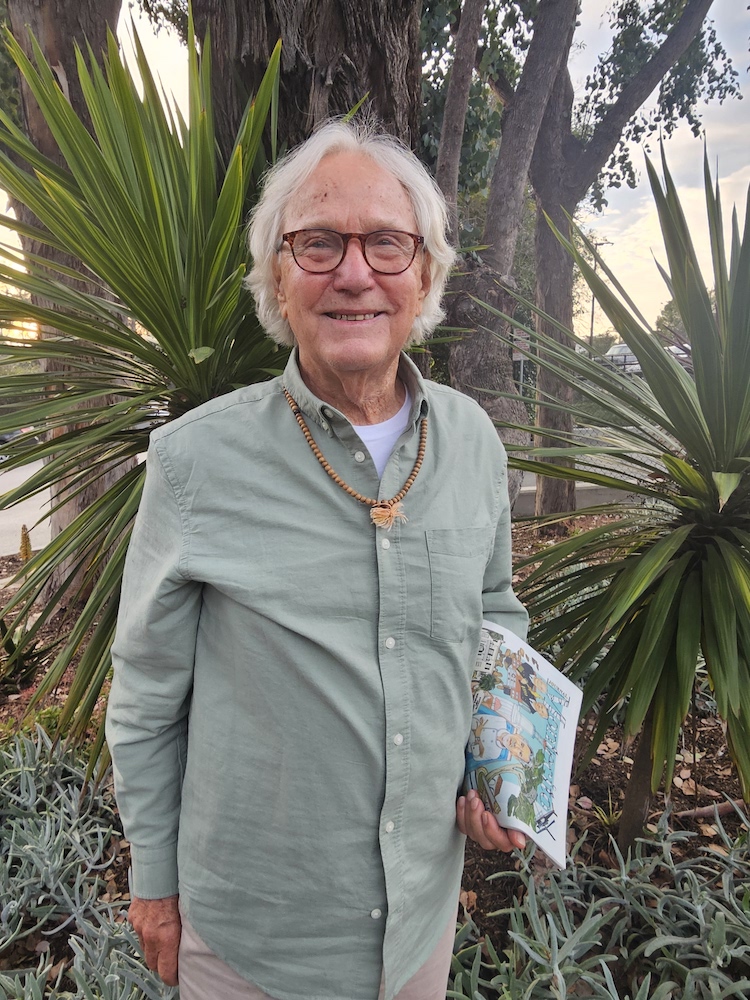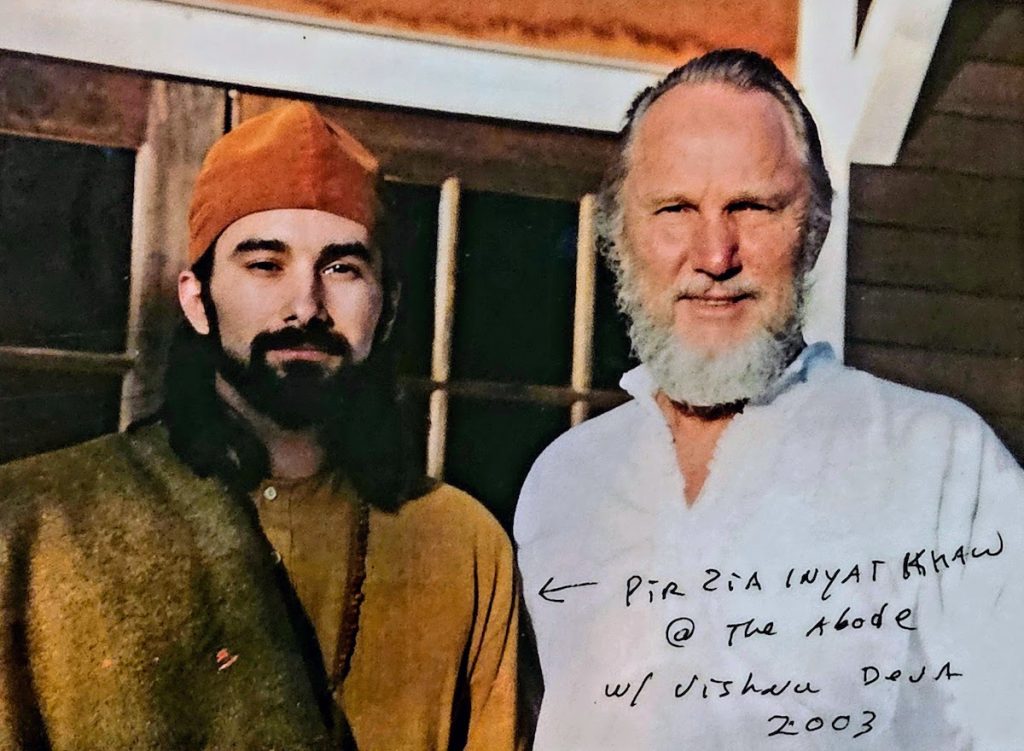Ivan Rasmussen and Dr. King: A Fork in the Freedom Road

Sometimes you idly head downtown to hear a public speaker and end up in Tanzania. It happened to Ivan Rasmussen. “I went to my apartment,” Rasmussen recalls of the fever that gripped him following the event. “I took out my pen and writing pad and got started. By midnight I’d essentially organized a civil rights team.” Prepossessing in a button-down shirt, mala beads and chinos when we met, Rasmussen could be described as a handsome, soft-spoken gentleman hippie. “I’ve lived in two African countries and traveled in 16,” he says almost to himself at one point; not with hubris but mild surprise. Yes, the evening in question gouged an unforeseen fork in Rasmussen’s road. Perspective? The year was 1965, the downtown speaker that evening: the Reverend Jesse Jackson. “What he had to say – the way he said it – completely inspired me,” Rasmussen murmurs. He took Jackson’s message and ran with it. For the rest of his life.
SCOPE and Voter Registration
Jesse Jackson’s engagement in Santa Barbara that night was part of a desperate speaking circuit. In August of ‘65, President Johnson signed the Voting Rights Act into law. Despite the ceremonial trappings – justice-dealing fountain pen, throng of reverent, besuited legislators, a squall of flash bulbs – the act’s effect was not immediately felt from sea to shining sea. In some benighted places it would remain difficult for a Black American citizen to exercise the sacrosanct right to vote. Unfortunately for the swaggering retrograde jackasses determined to keep Black Americans on their knees, the ‘60s saw an inflammatory sense of social justice roar to life as young men and women grew out buzz cuts, ditched saddle shoes, and stormed the battlements.
A close associate of Martin Luther King, Jr. in the Southern Christian Leadership Conference (SCLC), the Rev. Hosea Williams was Dr. King’s handpicked choice to lead a new initiative called SCOPE – Summer Community Organization and Political Education; a guerillacivil rights effort dressed up as a school project.In ‘65, the Rev. Williams and SCOPE wererecruiting activated college students from across the country and sending them in teams to voter disenfranchisement trouble spots in the south. UCSB students and campus roommates Lanny Kaufer and Phil McKenna had attended a SCOPE meeting and signed on. “I would call Lanny the leader of the UCSB SCOPE group,” Rasmussen says. In ‘65 and ‘66, SCOPE sent teams of young activist students to 120 counties in six southern states, Rasmussen among them.
Rasmussen and the UCSB group were assigned Virginia’s Sussex County. For these California students, the place may as well have been an exoplanet. “By the time we got there,” Rasmussen says, wide-eyed, “the integrated schools had been closed for an entire year, if you can believe it. And when we began to successfully integrate a restaurant in town, they closed it.” A profane sign posted outside the shuttered restaurant made it clear the closure was in lieu of having to serve Black people. “If the Black moviegoers sat in the last two seats of the balcony,” Ramussen says, “they could go to the cinema. The laundromat was for whites only. The library, as I recall, was for whites only. You just can’t imagine that in 1965 all this was happening a few hours south of the nation’s capital.”
Transparent Bigotry. Cautious Optimism.
The Black locals of Sussex County were cautiously optimistic about the SCOPE folk, but it took some time to wholly gain their trust. “They were very apprehensive about getting together with white northerners, understandably. So we demonstrated and we marched, we marched, we marched. Gradually they got involved.”
It was the teens who first embraced the visiting white students, marching alongside them in droves, politely rattling the white locals, and recertifying the decade as one defined by the rise of a newly-empowered youth culture. “We were hosted by black families the three months we were there,” Rasmussen recalls with fondness. “They were so kind. When we left, they put on a farewell feast for us. But as soon as we arrived, we’d started demonstrating and teaching classes on how to register to vote and how to get around the B.S. A black prospective voter trying to register would have first to successfully estimate how many beans there were in a presented mason jar. Can you imagine that? It was just terrible, transparent bigotry.”

There were more disincentives for the Black voters in Sussex County. The registrar’s office in Waverly, the county seat, was only open the first Monday of the month from 9 am to 3 pm, so one would likely have to miss several hours of work and risk losing their job to register – and most of the jobs in the county were tethered to bigoted State Senator Garland Gray, whose Gray Lumber was the largest employer in the area. Gray also owned a big local bank. The fix was in. When the registrar’s office wouldn’t budge on their hours and protocols, the frustrated SCOPE volunteers appealed to the Justice Department in D.C., who basically told Sussex County “make it easier for all your qualified voters or we’ll send our guys in and do it ourselves.” Compliance was at best grudging. SCOPE activists in Sussex County would be tailgated down a country lane by displeased, gun-waving locals at 100 mph, and were at one point locked in a laundromat, their clothes thrown on the floor and “disinfected” by the ranting proprietor. Elsewhere SCOPE volunteers were beaten, shot at, and tear gassed.
Defining Summer
Nevertheless, in the summer of ‘65, SCOPE volunteers in six southern states registered some 49,000 new Black voters. Ivan Rasmussen was one such volunteer, standing shoulder to shoulder with beleaguered Black citizens to right a plain-faced wrong. He would go on to foreign service projects with USAID in Tanzania and Niger, would work with the United Nations, and in a surreal set piece would visit the Moroccan village of Juju in the company of jazz giant Ornette Coleman. Seriously. But a defining moment that inaugural summer for Rasmussen – what we may call The First Summer of the Rest of his Life – was meeting Dr. King on a stage in Los Angeles. His teaching/lecturing gig had obliged Rasmussen to remain momentarily behind while most of the SCOPE team traveled ahead to Atlanta for their pre-Virginia orientation. “After they left, Martin Luther King came to a big rally in Los Angeles, and that’s how I was designated to present him with a ceremonial check, a donation to the SCLC. I met him on stage,” Rasmussen says, brows furrowed in the usual astonishment.
History is a pliable story edited through the millennia by those ordinary people aware of the human race’s collective agency and courageous enough to wield it. Guys like Ivan Rasmussen. One evening in the American Riviera, Jesse Jackson lit a fire in the guy, driving him to a self-revelatory life of service and social justice advocacy. Speaking earlier of his ecstatic evening with Ornette Coleman in Morocco, Rasmussen had inadvertently summarized his time on Earth so far. “I danced and danced until I was prostrate, and I felt transcendence.”






